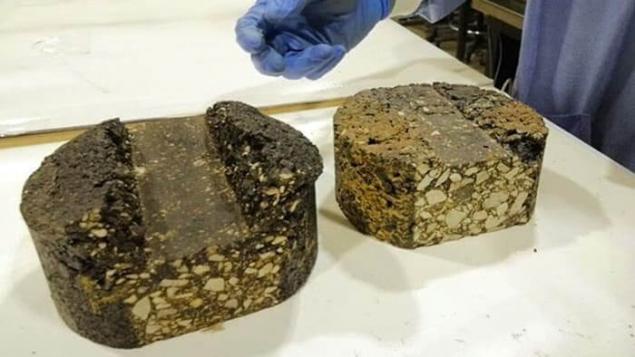528
Bioasfalt for sustainable road construction
Researchers from the National Technical and Agricultural University of North Carolina have developed a process that uses pig manure as a cheap replacement of oil in the production of road asphalt.

In search of alternatives to the biological team found that pig waste oils are particularly rich, very similar to the oil, the class which is too low to make gasoline, but it is suitable for asphalt.
With financial support from the National Science Foundation, the group developed a process that converts the waste into black bitumen - sticky binder which can be used to create asphalt. The cost of producing bitumen from manure is $ 0, 56 per gallon, which is much cheaper and more environmentally friendly than the current binding on the US market on the basis of oil.
"The process is different from the technology of the refinery, which surpasses the crude oil to produce mainly fuel oil reserves for the asphalt," said Ellie Finney (Ellie Fini), a leading researcher and Associate Professor of Civil Engineering Department of the University.
"Here we produce biological viscous material, destroying the molecular structure of the biomass and re-synthesize adhesive structure on a biological basis. Bio-viscous material is much cheaper, requires less heat for mixing and compaction and more durable. »

Drivers can not worry about the smell of the road, because the compounds which impart pig manure his sharp and pungent smell - volatile fatty acids are filtered out during processing. A dry matter left over from the process can be used as fertilizer.
At the same time, bio-asphalt goes through rigorous testing to see how it will behave in real-world traffic conditions, including 20 000 trucks run simulation cycles. So far, all the tests have been successful and have shown compliance with the Traffic Department of the specification, which has led to the creation of a group of Bio-Adhesives companies to expand their research.
"We believe that the transition to a commercial basis is economically beneficial," says Feeney. "Our vision is to help farmers and the construction industry. We see the win-win approach for both parties. »
Asphalt is produced from pig manure can fix what has become a huge environmental problem - waste water from rural ferm- especially in large agricultural states such as North Carolina
. "We produce 43 billion gallons of pig manure in the world every year," says Daniel Oldham (Daniel Oldham), researcher on the project, adding that China produces 10 times more than the US.
At the same time, in the US $ 2, 3 million miles of paved roads, while the traditional petroleum asphalt coating cost of laying urban two-lane road is over $ 800 per mile.

In search of alternatives to the biological team found that pig waste oils are particularly rich, very similar to the oil, the class which is too low to make gasoline, but it is suitable for asphalt.
With financial support from the National Science Foundation, the group developed a process that converts the waste into black bitumen - sticky binder which can be used to create asphalt. The cost of producing bitumen from manure is $ 0, 56 per gallon, which is much cheaper and more environmentally friendly than the current binding on the US market on the basis of oil.
"The process is different from the technology of the refinery, which surpasses the crude oil to produce mainly fuel oil reserves for the asphalt," said Ellie Finney (Ellie Fini), a leading researcher and Associate Professor of Civil Engineering Department of the University.
"Here we produce biological viscous material, destroying the molecular structure of the biomass and re-synthesize adhesive structure on a biological basis. Bio-viscous material is much cheaper, requires less heat for mixing and compaction and more durable. »

Drivers can not worry about the smell of the road, because the compounds which impart pig manure his sharp and pungent smell - volatile fatty acids are filtered out during processing. A dry matter left over from the process can be used as fertilizer.
At the same time, bio-asphalt goes through rigorous testing to see how it will behave in real-world traffic conditions, including 20 000 trucks run simulation cycles. So far, all the tests have been successful and have shown compliance with the Traffic Department of the specification, which has led to the creation of a group of Bio-Adhesives companies to expand their research.
"We believe that the transition to a commercial basis is economically beneficial," says Feeney. "Our vision is to help farmers and the construction industry. We see the win-win approach for both parties. »
Asphalt is produced from pig manure can fix what has become a huge environmental problem - waste water from rural ferm- especially in large agricultural states such as North Carolina
. "We produce 43 billion gallons of pig manure in the world every year," says Daniel Oldham (Daniel Oldham), researcher on the project, adding that China produces 10 times more than the US.
At the same time, in the US $ 2, 3 million miles of paved roads, while the traditional petroleum asphalt coating cost of laying urban two-lane road is over $ 800 per mile.
Condensing boilers in the autonomous heat supply
Strawberry kvass - a delightful color and a magic fragrance!
























